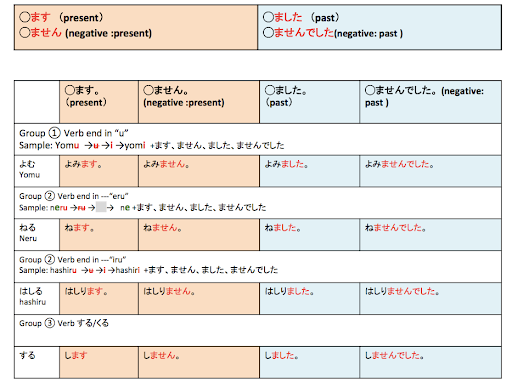Tips for More Effective Studying
Nihongo Online School > Tips for More Effective Studying > [Types of verb & Forms of verb]-Lesson 1 Basic Sentence With “~masu(ます)” Form
[Types of verb & Forms of verb]-Lesson 1 Basic Sentence With “~masu(ます)” Form

2024/07/24
Lesson 1 “~masu(ます)” form
The “~masu(ます)” form is also called “ていねいけい (Teinei, the polite form)”. It is most widely used in various situations.
There are only two tenses for the form: past tense and non-past tense.
In order to change the dictionary verb form into the proper “~masu” form, the following conjugation rules must be applied.
Japanese Verbs “~masu” Form Short List:
“~masu” Form has 3 groups, so let’s discuss how to apply it appropriately.
■Group① Verbs End In “u”
When it changes to “~masu” form, “u” change to “i”.
Sample: よむ = yomu (to read) → u change to i = yomi + masu
If it’s past tense, yomi + mashita
Other “u” to “i” verbs list:
| Informal | Formal (Non-Past Tense) | Formal (Past Tense) | |
|---|---|---|---|
| To Read | よむ = yomu | よみます = yomimasu | よみました = yomimashita |
| To Write | かく = kaku | かきます = kakimasu | かきました = kakimashita |
| To Play | あそぶ = asobu | あそびます = asobimasu | あそびました = asobimashita |
| To Swim | およぐ = oyogu | およぎます = oyogimasu | およぎました = oyogimashita |
| To Meet | あう = au | あいます = aimasu | あいました = aimashita |
| To Wash | あらう = arau | あらいます = araimasu | あらいました = araimashita |
| To Send | おくる = okuru | おくります = okurimasu | おくりました = okurimashita |
| To Finish | おわる = owaru | おわります = owarimasu | おわりました = owarimashita |
| To Win | かつ = katsu | かちます = kachimasu | かちました = kachimashita |
| To Sit | すわる = suwaru | すわります = suwarimasu | すわりました = suwarimashita |
Here are some examples of real-life conversations:

きょう、ともだちと、あいます。
Kyou, tomodachi to aimasu.
I will meet my friend today.
※あう(au) to meet →u→i =ai masu

ほんを、よみました。
Honwo yomimashita.
I read the book.
■Group② Verbs End In “eru” Or “iru“
For example, when it change to Masu form, “taberu” change to “tabe + masu”. In case, the word ends in “iru”, “hashiru” change to “hashiri + masu. “U” replace the “i”.
“eru” to “masu” verbs list:
| Informal | Formal (Non-Past Tense) | Formal (Past Tense) | |
|---|---|---|---|
| To Eat | たべる = taberu | たべます = tabemasu | たべました = tabemashita |
| To Memorize | おぼえる = oboeru | おぼえます = oboemasu | おぼえました = oboemashita |
| To Think | かんがえる = kangaeru | かんがえます = kangaemasu | かんがえました = kangaemashita |
| To Go Out | でる = deru | でます = demasu | でました = deimashita |
| To Sleep | ねる = neru | ねます = nemasu | ねました = nemashita |
“iru” to “masu” verbs list:
| Informal | Formal (Non-Past Tense) | Formal (Past Tense) | |
|---|---|---|---|
| To Run | はしる = hashiru | はしります = hashirimasu | はしりました = hashirimashita |
| To Enter | はいる = hairu | はいります = hairimasu | はいりました = hairimashita |
| To Cut | きる = kiru | きります = kirimasu | きりました = kirimashita |

きのう、ごはんをたべませんでした。
Kinou, gohanwo tabemasendeshita.
I didn’t eat yesterday.
■Group③ Verbs Suru(する) and Kuru(くる)
The stem will change for these verbs.
“suru” and “kuru” to “masu” verbs list:
| Informal | Formal (Non-Past Tense) | Formal (Past Tense) | |
|---|---|---|---|
| To Do | ◯◯する = suru | ◯◯します = shimasu | ◯◯しました = shimashita |
| To Come | くる = kuru | きます = kimasu | きました = kimashita |

がっこうで、べんきょうをします。
Gakkoude benkyouwo shimasu.
I study at school.

ともだちがいえに、きました。
Tomodachiga ieni kimashita.
My friend came to my house.

きのう、しゅくだいをしました。
Kinou, syukudaiwo shimashita.
I studied homework yesterday.
Let’s practice the “~masu” form with the list below!
If you complete Lesson 2, let’s move on to [Types of verb & Forms of verb] Lesson 2.
About Us
We are Nihongo Online School, which provides individual (1-on-1) Japanese online lessons from qualified native Japanese language teachers.
If you are interested, please check our course.

